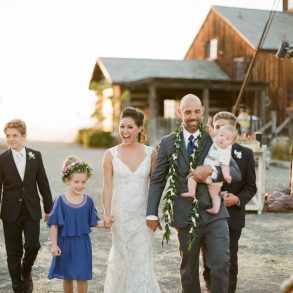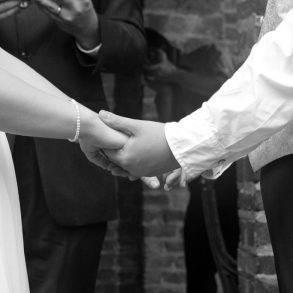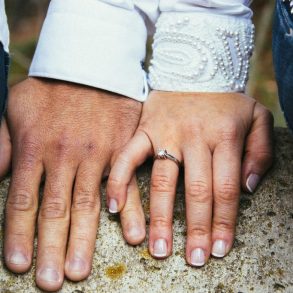The Ceremony to bless a marriage (a couple who has already married civilly, outside the church), otherwise known as the Marriage Blessing Ceremony
Background:
Marriage as a social institution is as old as the human race. It was “instituted of God” in the Garden of Eden (Gen. 1:27–28; 2:18, 24) and obviously is not of Christian origin. It belongs to all mankind… to Jew, Gentile and Christian alike.
The essence of marriage is the mutual agreement between a man and a woman for a lifelong union, voluntarily assumed, and publicly acknowledged. The Church, in providing a fitting setting and a beautiful ceremony for its announcement and public ratification, does all in its power to safeguard the union and to make of it what a marriage ought to be.
The mutual contract between bride and groom can be acknowledged and publicly ratified before a Justice of the Peace or other officer of the State; but such a marriage, though legal, lacks a very definite “something” which a religious service gives it. That “something” is the blessing of the Church, and it gives the newly married couple a deeper understanding of God’s wish for them.
The civil ceremony lacks religious reference but like the church, still asks for similar consents. The “Mutual Consent” consists of questions to both bride and groom and may seem like a needless formality, “do you take this man” and so on, but this is necessary to fulfill the nature of the civil contract. The State is strict on determining consent of each party just as it would in any other signed civil contract. The civil ceremony, by design, simply lacks any reference of prayers to the Trinity, or in seeking any blessings from a creator.
Some couples, for reasons they may see as valid, choose a civil ceremony, opting for a church blessing at a later time. If that is their choice, then the church recognizes and provides for that choice in the form of a Blessing of a Civil Ceremony. As an Episcopal Priest, I have been asked many times to perform such blessings. However, the Blessing of the Marriage is not a wedding.
Other couples have chosen to marry civilly in order to gain financial benefits, quietly embark on buying a house, obtain health insurance for a spouse, etc. However, the Blessing of the Civil Ceremony should never be thought of as the “real” wedding later on so, if you’re considering marrying civilly, but really want the big white church wedding, please make your choice beforehand. I have had, on several occasions, planned and counseled with couples only to find out on the day of the wedding that they have been already married by a Justice of the Peace. They don’t tell family members and in some cases ask the clergy to ‘keep their little secret” on their behalf if any family member is suspicious. This is lying…not a great way to start out a life together. As a clergyman, it is always my hope that couples are open and honest with their friends and family (and themselves) as they begin life as a married couple.
In conclusion, if you have been married by the court “You Are Married“. If you are seeking the blessing of the church, realize that it has no bearing on your true wedding date or legal contract. You already have this. You’re not lacking in anything any other married couple has unless they had a church wedding and therefore God’s blessing on the union.
Remember, marriage isn’t about the day; it’s about the day after, and the day after that. If you have already been married in a civil ceremony, the church will certainly welcome you to receive a marriage blessing of your union . But, this is as it sounds; a blessing of the marriage that has already taken place. It provides for the public acknowledgment of the couples’ desire to live up to the vows they have already made and now affirm before God and His people but is not the couple’s second chance at a “real wedding” with all of the bling. Make all of you life choices with much thought.
Blessing of the Marriage Ceremony
The Rite begins as prescribed for celebrations of the Holy Eucharist, using the Collect and Lessons appointed in the Marriage service.
After the Gospel (and homily), the husband and wife stand before the Celebrant, who addresses them in these or similar words
[quote align=”center”]N. and N., you have come here today to seek the blessing of God and of his Church upon your marriage. I require, therefore, that you promise, with the help of God, to fulfill the obligations which Christian Marriage demands.[/quote]
The Celebrant then addresses the husband, saying
[quote align=”center”]N., you have taken N. to be your wife. Do you promise to love her, comfort her, honor and keep her, in sickness and in health; and, forsaking all others, to be faithful to her as long as you both shall live?[/quote]
The Husband answers I do.
The Celebrant then addresses the wife, saying
[quote align=”center”]N., you have taken N. to be your husband. Do you promise to love him, comfort him, honor and keep him, in sickness and in health; and, forsaking all others, to be faithful to him as long as you both shall live?[/quote]
The Wife answers I do.
The Celebrant then addresses the congregation, saying
[quote align=”center”]Will you who have witnessed these promises do all in your power to uphold these two persons in their marriage?[/quote]
People/Congregation: We will.
If a ring or rings are to be blessed, the wife extends her hand (and the husband extends his hand) toward the Priest, who says;
[quote align=”center”]Bless, O Lord, this ring to be a sign of the vows by which this man and this woman have bound themselves to each other; through Jesus Christ our Lord. Amen.[/quote]
The Celebrant joins the right hands of the husband and wife and says;
[quote align=”center”]Those whom God has joined together let no one put asunder[/quote]
The Congregation responds Amen.
The Vows for the Blessing of the Marriage Ceremony
The Husband, facing the Wife and taking her right hand in his, says;
[quote align=”center”]In the presence and Name of God, I, N., take you, N., to be my wife, to have and to hold from this day forward, for better for worse, for richer for poorer, in sickness and in health, to love and to cherish, until we are parted by death. This is my solemn vow.[/quote]
Then they loosen their hands, and the Wife, still facing her Husband, takes his right hand in hers, and says:
[quote align=”center”]In the presence and Name of God, I, N., take you, N., to be my husband, to have and to hold from this day forward, for better for worse, for richer for poorer, in sickness and in health, to love and to cherish, until we are parted by death. This is my solemn vow.[/quote]
They loosen their hands.
The clergy person may ask God’s blessing on a ring or rings as follows
[quote align=”center”]Bless, O Lord, this ring (these rings) given as a sign of the vows by which this man and this woman have bound themselves to each other; through Jesus Christ our Lord. Amen.[/quote]
Then the Celebrant joins the right hands of husband and wife and says;
[quote align=”center”]Now that N. and N. have exchanged these solemn vows, with the joining of hands and the blessing of a ring, I pronounce their marriage blessed, in the Name of the Father, and of the Son, and of the Holy Spirit. Those whom God has joined together let no one put asunder.[/quote]
People/Congregation: Amen.
Readings for the Blessing of the Marriage Ceremony
Then one or more of the following passages from Holy Scripture is read. If there is to be a Communion, a passage from the Gospel always concludes the Readings.
[list type=”check”]
- Genesis 1:26-28 (Male and female he created them)
- Genesis 2:4-9, 15-24 (A man cleaves to his wife and they become one flesh)
- Song of Solomon 2:10-13; 8:6-7 (Many waters cannot quench love)
- Tobit 8:5b-8 ( New English Bible ) (That she and I may grow old together)
[/list]
[list type=”check”]
- 1 Corinthians 13:1-13 (Love is patient and kind)
- Ephesians 3:14-19 (The Father from whom ever family is named)
- Ephesians 5:1-2, 21-33 (Walk in love, as Christ loved us)
- Colossians 3:12-17 (Love which binds everything together in harmony)
- 1 John 4:7-16 (Let us love one another for love is of God)
[/list]
Between the Readings, a Psalm, hymn, or anthem may be sing or said. Appropriate Psalms are 67, 127, and 128.
When a passage from the Gospel is to be read, all stand, and the Deacon or Minister appointed says
[list type=”check”]
- The Holy Gospel of our Lord Jesus Christ according to ______.
- People Glory to you, Lord Christ.
[/list]
[list type=”check”]
- Matthew 5:1-10 (The Beatitudes)
- Matthew 5:13-16 (You are the light…Let your light so shine)
- Matthew 7:21,24-29 (Like a wise man who built his house upon the rock)
- Mark 10:6-9,13-16 (They are no longer two but one)
- John 15:9-12 (Love one another as I have loved you)
[/list]
After the Gospel, the Reader says
The Gospel of the Lord.
People Praise to you, Lord Christ.
A homily or other response to the Readings may follow.
So, you see, the blessing isn’t a re-marriage or the “real wedding”. (Though, Roman Catholics believe you aren’t “really” married until you do it in the church.) The rest of Chirstendom simply recognizes them as husband and wife who come seeking God’s blessing on their marriage as the BCP above indicates. You have done the legal, do you promise to fulfill what you have done together in a blessed christian marriage?
Marriage blessing ceremony and vows Courtesy of The Reverend Canon Ian D. Anderson, Ph.D









